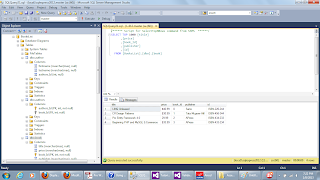Step 1) Import XML file into DataSet
ds.ReadXml("c:\data\books.xml")Once you import books.xml into DataSet. It will create multiple tables based on xml data.
In our case, Book has many authors, so 1-many relationship will be created between book(one)-authors(many).
The above dataset has 3 tables.
1.book table
2.author table
3.authors table(relationship between table 1 & 2).
Step 2) Create Database using DataSet(i.e SqlServer Management Objects SMO)
Creating Database using SQLServer Management Objects(SMO).
I am naming database as "BooksList", Creating 3 tables that exists in above dataset.
Using SQLServer Management Objects in C#/ASP.NET/WPF
Add following references located in C:\Program Files\Microsoft SQL Server\110\SDK\Assemblies
- Microsoft.SqlServer.ConnectionInfo.dll
- Microsoft.SqlServer.Smo.dll
- Microsoft.SqlServer.SqlEnum.dll
- Microsoft.SqlServer.Management.Sdk.Sfc.dll
void CreateDataBase()
{
if (ds.Tables.Count == 0) LoadXmlIntoDataSet();
try
{
Microsoft.SqlServer.Management.Smo.Server server =
new Microsoft.SqlServer.Management.Smo.Server(new ServerConnection()
{
ConnectAsUser = false,
ServerInstance = @"machinename\sqlexpress2012",
DatabaseName = "master",
ConnectAsUserName = "sa",
ConnectAsUserPassword = "password"
});
Database db = new Database(server, "master");
db.Name = "BooksList";
//db.Drop();
AddDBTables(db);
CreateDatabse_and_tables(db);
CreateForeignKeysForTables(db);
db.AutoClose = true;
}
catch (Exception ex)
{
Response.Write(ex.Message);
}
}
void CreateForeignKeysForTables(Database db)
{
ForeignKey fKeybook = new ForeignKey(db.Tables["authors"], "book_table_book_id");
fKeybook.IsEnabled = true;
ForeignKeyColumn fkbookidcol = new ForeignKeyColumn(fKeybook, "book_id", "book_id");
fKeybook.Columns.Add(fkbookidcol);
fKeybook.ReferencedTable = "book";
fKeybook.Create();
}
void CreateDatabse_and_tables(Database db)
{
db.Create();
foreach (Microsoft.SqlServer.Management.Smo.Table table in db.Tables)
{
table.Create();
}
}
void AddDBTables(Database db)
{
foreach (DataTable tbl in ds.Tables)
{
Microsoft.SqlServer.Management.Smo.Table table =
new Microsoft.SqlServer.Management.Smo.Table(db, tbl.TableName);
//Adding DB columns to database table
//using DataSet table columns
AddDBColumns(table, tbl);
db.Tables.Add(table);
}
}
void AddDBColumns(Microsoft.SqlServer.Management.Smo.Table table,
DataTable datatable)
{
foreach (DataColumn col in datatable.Columns)
{
Column tblcol = new Column();
tblcol.Name = col.ColumnName;
//tblcol.Create();
table.Columns.Add(tblcol);
if(col.DataType.Name=="String"){
tblcol.DataType = DataType.NVarChar(col.MaxLength);
}
if (col.DataType.Name == "Int32" || col.DataType.Name == "Int64")
{
tblcol.DataType = DataType.Int;
}
tblcol.Default = col.DefaultValue.ToString();
tblcol.Nullable = col.AllowDBNull;
if (col.AutoIncrement)
{
tblcol.Nullable = false;
Index idx = new Index(table, "pk_" + col.ColumnName);
idx.IndexedColumns.Add(new IndexedColumn(idx,tblcol.Name));
idx.IsClustered = true;
idx.IsUnique = true;
idx.IndexKeyType = IndexKeyType.DriPrimaryKey;
table.Indexes.Add(idx);
tblcol.Identity = col.AutoIncrement;
tblcol.IdentityIncrement = col.AutoIncrementStep;
tblcol.IdentitySeed = col.AutoIncrementSeed;
}
}
}
//Once Database is Created with table objects.
//we can populate Database tables (just now created step2) using ADO.NET Bulk Insert
Step 3) Bulk Insert Datatable into SqlServer
void BulkInsertData()
{
SqlBulkCopy blkCopy = new SqlBulkCopy(@"server=(local)\SqlExpress2012;
uid=sa;pwd=password;database=BooksList",SqlBulkCopyOptions.KeepIdentity);
foreach (DataTable table in ds.Tables)
{
blkCopy.DestinationTableName = table.TableName;
blkCopy.WriteToServer(table);
}
blkCopy.Close();
}
books.xml
<?xml version="1.0" encoding="utf-8" ?>
<bookslist>
<book id="ISBN-220-244">
<title>LINQ Unleased</title>
<price>$40.99</price>
<authors>
<author>
<firstname>Kimmel </firstname>
<lastname>Paul</lastname>
</author>
</authors>
<publisher>Sams</publisher>
</book>
<book id="ISBN-456-344">
<title>C# Design Patterns</title>
<price>$30.99</price>
<authors>
<author>
<firstname>john</firstname>
<lastname>peter</lastname>
</author>
<author>
<firstname>mary</firstname>
<lastname>kurl</lastname>
</author>
</authors>
<publisher>Tata Mcgraw Hill</publisher>
</book>
<book id="ISBN-434-233">
<title>Pro Entity Framework 4.0</title>
<price>29.99</price>
<authors>
<author>
<firstname>Scott</firstname>
<lastname>Klein</lastname>
</author>
</authors>
<publisher>APress</publisher>
</book>
<book id="ISBN-433-234">
<title>Beginning PHP and MySQL E-Commerce</title>
<price>$35.99</price>
<authors>
<author>
<firstname>Cristian</firstname>
<lastname>Darie</lastname>
</author>
<author>
<firstname>Emilian</firstname>
<lastname>Balanescu</lastname>
</author>
</authors>
<publisher>APress</publisher>
</book>
</bookslist>

Nice post very helpful
ReplyDeletedbakings